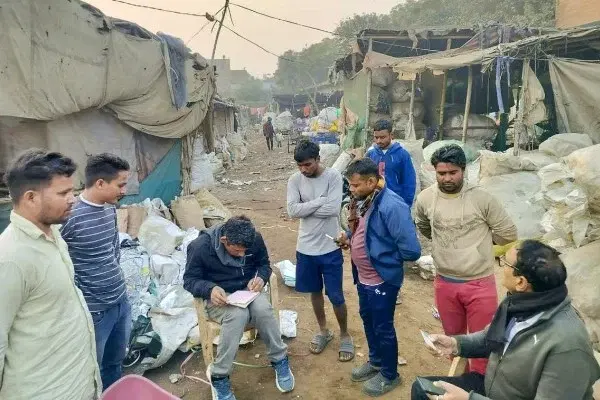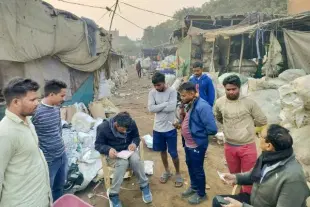West Bengal
Mamata Banerjee Is Wrong: Illegal Bangladeshi Immigrants Are Not Bengalis
Jaideep Mazumdar
Aug 01, 2025, 11:46 AM | Updated 11:46 AM IST
Save & read from anywhere!
Bookmark stories for easy access on any device or the Swarajya app.


Over the past few weeks, the Bengal Chief Minister has been raising a hue and cry over the crackdowns on Bangladeshi Muslims and Rohingyas launched in other states. She has tried to cleverly portray that Bengalis are being targeted in other states.
But, as so often happens, CM Banerjee is wrong. And she knows it. It is not Bengalis, but Bangladeshi Muslims, who are being targeted in states like Odisha, Assam, Maharashtra, Haryana, Delhi, and Chhattisgarh. And rightly so, because they have no legal right to reside in India.
All these Bangladeshi Muslims, whether they or their parents or grandparents entered India illegally, possess Aadhaar, Voter ID, ration cards, and even passports. Many also hold land and property in Bengal.
The possession of these documents and land deeds is frequently cited as proof of Indian citizenship. However, these papers are not valid proof of citizenship and should not be treated as such. They can often be obtained using fabricated documents and forged credentials, especially in Bengal.
Other states are justified in questioning the authenticity of such documents and in initiating investigations to determine whether the Aadhaar, Voter ID, or ration cards presented by Bangladeshi Muslims as evidence of citizenship were obtained through valid channels.
Many such investigations are already revealing that these documents belong to individuals who are, in fact, illegal entrants from Bangladesh.
One particularly shocking case is that of 42-year-old Palash Adhikari, who was detained in Madhya Pradesh on suspicion of being a Bangladeshi national. Palash presented his PAN card, Aadhaar, and Voter ID as evidence of Indian citizenship (see this post on X). The police, unconvinced by the documents, arrested him.
When Palash was brought before a court, he was recorded as the son of Ramesh Adhikari, a resident of Kashimpur in Bengal’s Malda district. The court ordered an investigation. A preliminary inquiry confirmed that the documents matched the voters’ list and Aadhaar database. Ramesh Adhikari, reportedly born in 1962 in Malda, had four sons listed, including Palash.
Records showed Ramesh had been voting since 1984, and his wife and four sons were listed in the electoral rolls. But the police remained skeptical and sought permission to investigate further.
They examined reports from the Special Intensive Revision (SIR) of electoral rolls conducted in 2002. Those reports revealed that Ramesh had only two sons at the time—Subrata, aged 28, and Soumen, aged 30. No mention was made of Palash or Rahul, the two additional sons reportedly born to Ramesh.
Further checks of electoral records from 2010 showed no entry for Palash or Rahul. Palash claimed his name was added to the electoral roll in 2015.
The police then launched an inquiry into Ramesh Adhikari’s background. They found that he married in 1993, had his first son Subrata in 1995, and second son Soumen in 1997. That timeline made it impossible for Palash, aged 42, to be his son, as Palash would have been born a full decade before Ramesh's marriage.
Under intensive questioning, Palash admitted that his real name was Sheikh Moinuddin, and that he hailed from Ahmedpur in Bangladesh’s Khulna district. Ramesh Adhikari had no knowledge of Palash or Rahul. Rahul’s whereabouts remain unknown, but there is no doubt that he too is a Bangladeshi national.
So how did Sheikh Moinuddin become Palash Adhikari? The answer lies in the complicity of local Trinamool Congress functionaries and government officials who falsified records to provide him with a fake Hindu identity as the son of a legitimate Indian farmer.
This case is only one among the many. There are millions of Bangladeshi Muslims who, with the support of Trinamool Congress (and the CPIM before 2011), as well as government employees, have forged documents to gain inclusion in voters’ lists and secure other identification papers.
“Bangladeshis do not sneak into India at random,” said Sunil Bhatnagar, a retired BSF officer who once commanded battalions in South Bengal. “Their illegal entry—often through unfenced stretches or by evading BSF patrols—is orchestrated by traffickers operating on both sides of the border. Once inside India, they are taken to safe houses in border villages. Local residents are complicit in this process.”
Bhatnagar, who now lives in Uttarakhand, told Swarajya that the process of generating false documentation begins immediately after the infiltrators arrive.
“A headmaster may be bribed or coerced to issue a fake certificate declaring the infiltrator a former student. A house owner signs a document claiming long-term tenancy. A local panchayat issues a certificate asserting that the person has been a resident for years. Sometimes, even police records are manipulated to reflect a fake history of residence. Municipalities, under the control of the ruling party, readily issue false birth and residential certificates,” Bhatnagar explained.
In cases like Palash Adhikari’s, electoral rolls are manipulated to falsely show that Bangladeshi Muslims are the children of genuine Indian citizens.
Once such foundational documents are secured, these individuals are helped by local politicians and officials to acquire ration cards and Aadhaar. These are then used to get enrolled as voters. After that, they often migrate to other states in search of work, posing as Indian citizens.
Bhatnagar, along with two other senior BSF officers, had co-authored a white paper some years ago detailing how Bangladeshis illegally enter India and systematically forge a path to citizenship.
The political motivation behind this is clear. According to junior Union Minister and former Bengal BJP president Sukanta Majumdar, “The Trinamool Congress, and the communist parties before them, have enabled this illegal influx and provided forged documents purely to build a loyal vote bank. These illegal immigrants, once regularised, vote in large numbers for the party that helped them.”
This is why possession of documents like Voter ID, Aadhaar, PAN, or even a passport should never be treated as irrefutable evidence of Indian citizenship.
Such documents must be investigated thoroughly rather than accepted at face value. The underlying certificates (residential, birth, school) that were used to obtain Aadhaar and Voter ID must also be verified and cross-checked. If that is done, countless Sheikh Moinuddins posing as Palash Adhikaris will be uncovered.
What is often overlooked in political debates is the demographic transformation already underway in Bengal and Assam, now extending into other states. This shift is sparking social tensions and, in some places, outbreaks of communal violence.
Take the case of Sambalpur in northwestern Odisha. Bangladeshi Muslims began settling there as laborers about 20 years ago. They mostly live in slums near Sakhipara Main Road and have constructed several masjids.
Their numbers have increased, and Muslims now make up nearly nine percent of the population in Sambalpur. In recent years, Bangladeshi-origin Muslims, not local Odia Muslims, have become more assertive. Two years ago, they objected to the Rath Yatra procession passing by a masjid. Last year, some of them pelted stones at the devotees, triggering retaliation and unrest.
These slums have also become crime hubs. Many individuals from this community have been arrested for various criminal activities. Recently, the Odisha Police conducted a crackdown based on intelligence inputs regarding the presence of Islamist modules within this group. Several suspected Bangladeshis were detained, and document verification confirmed their status as illegal infiltrators.
Naturally, Mamata Banerjee criticized the Odisha Police, alleging that Bengalis were being unfairly targeted.
The Bengal government will predictably oppose such identification drives in other states. Mamata Banerjee has a vested interest in preventing such frauds from being exposed. Her political fortunes rest on protecting this voter base. But other states must not be discouraged from continuing this necessary scrutiny.
It is also essential to identify and take legal action against the politicians, civic functionaries, and government employees who helped facilitate this fraud. Tracking them will not be difficult. Once identified, they must be prosecuted. Issuing fraudulent documents to foreigners in order to gain them citizenship should be considered a seditious act and punished accordingly.
Finally, a clear distinction must be made between Bengalis (whether Hindu or Muslim) and Bangladeshis. The language, dialect, cultural traits, and social practices of the two groups differ significantly. Bangladeshi migrants speak regional dialects that differ markedly from the Bengali spoken in West Bengal.
Culturally too, the differences are stark. Bangladeshi Muslims are not the same as Bengali Muslims. As for Hindu refugees who fled Islamist persecution in Bangladesh and entered India illegally, the Citizenship Amendment Act (CAA) provides a legitimate route for them to gain Indian citizenship.
Mamata Banerjee’s attempts to blur this line by portraying Bangladeshi Muslims as Bengalis will not succeed. Bengalis in India are well aware of the difference. That is why, as the BJP rightly points out, Bengalis in other states are helping authorities identify Bangladeshi Muslims who attempt to pass themselves off as Indians.





